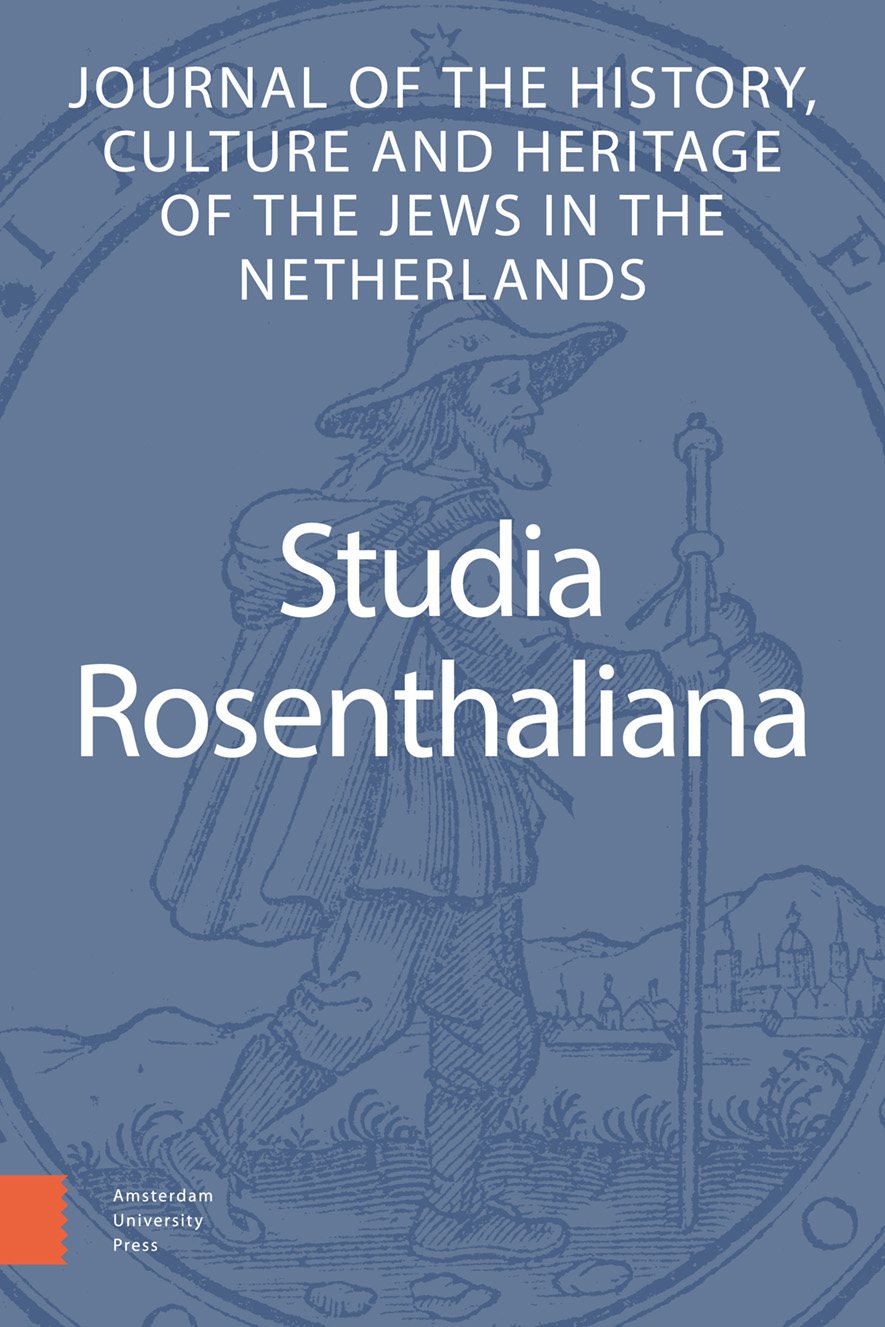- Home
- A-Z Publications
- Studia Rosenthaliana
- Previous Issues
- Volume 48, Issue 2, 2022
Studia Rosenthaliana - Volume 48, Issue 2, 2022
Volume 48, Issue 2, 2022
- Articles
-
-
-
Establishing ‘Friendship’, A Dutch-Ottoman Alliance for Trade and Jewish Settlement Rights
More LessAbstractIn July 1612, the Dutch Republic signed a capitulation with the Ottoman Empire referred to as ‘the friendship’, which established an important trading relationship for the Dutch in the region. This article points to the contribution of Constantinople’s Jewish community in establishing this trade agreement by connecting the alliance to the request for Jewish settlement in the Republic that was filed shortly after. On 26 October 1612, Lambert Verhaer, the right-hand man of the Dutch consul Cornelis Haga (1578-1654) in Constantinople, presented a request with the States General for ‘Jews or Portuguese’ to settle freely in the United Provinces under the protection of the Dutch rulers. Using letters sent between Constantinople and the Dutch Republic, the present article reconstructs these events that manifest that Jewish settlement in the Dutch Republic was not solely locally constructed but the sum of Sephardic diaspora communities’ efforts. Additionally, this article includes an anonymous, undated and unpublished letter from the Ets Haim Library (EH 48 A 03 11) on Dutch provincial Jewish settlement.
-
-
-
-
How Jewish Leaders Lobbied for Rights and Renegotiated Community While Besieged in Dutch Brazil, 1645–1654
More LessAbstractBeginning in the 1630s, Dutch Brazil sheltered the first openly-Jewish community in the Americas. In 1645, however, Catholic rebels overran the sugar-producing hinterland of the colony, executed Jewish prisoners, and besieged the capital.
This article analyses Jewish community leaders’ responses to these disasters. First, Jews demonstrated their loyalty and petitioned Dutch authorities to gain protection against both their Catholic enemies and their Protestant neighbours. Next, Jewish leaders leveraged their relationship with the government to gain authority over all Jews in Dutch Brazil. Finally, Jews gained representation in decisions affecting the entire colony, although their newfound political power was insufficient to prevent the colony’s surrender in 1654.
Veterans of Dutch Brazil helped found the Jewish communities of New Amsterdam, Curaçao, Suriname, Barbados, and Jamaica. Thus, analyzing communal strategies in the tumultuous final decade of Dutch Brazil enriches our understanding of the next phase of Atlantic Jewish history.
-
-
-
The Key Role of Maskiel El Dal and Dr. E.J. Goldsmit in the Smallpox Vaccination in Amsterdam. ‘Blessed is he that Considereth the Poor’
More LessAbstractSince outbreaks of smallpox in children occurred frequently during the early modern period and the death rates of children in Amsterdam were quite high, the long-awaited decree of the King for vaccinating the poor did not fall on deaf ears. Dr. Goldsmit embarked on a journey which has made a difference in the health settings of the Jewish Ashkenazi community, when he chose to try out Jenner’s vaccination method against smallpox. Dr. Goldsmit’s strong belief in the value of the new vaccination method helped to achieve his goal in vaccinating as many children as possible – Jewish and Christian alike. The Jewish doctor requested the help of the Parnassim, which led to the publication of the Maskiel El Dal’s Manifesto, urging parents to have their children vaccinated by Dr. Goldsmit. From that moment the vaccination rate in the Jewish community climbed. Dr. Goldsmit’s lifelong mission had been acknowledged and commended not only by the Jewish community of Amsterdam but also by his Christian peer physicians, who saluted and encouraged him at the same time.
-
-
-
The Netherlands and the Jewish Emigration from Poland 1967-1972: an Honorary Cause
More LessAbstractOn June 12, 1967, most Warsaw Pact nations severed diplomatic relations with Israel. Following diplomatic custom, the mutual interests of Israel, Poland and the Soviet Union were to be represented by third countries to continue diplomatic contact. Israel requested the Netherlands, their best friend, to look after Israeli interests, both in Poland and in the Soviet Union. Using archives of the Dutch Ministry of Foreign Affairs at the National Archives and interviews with the four Third Secretaries at the embassy between 1966 and 1973, this article describes part of the history of the Dutch diplomatic representation of Israel in Warsaw and in particular the Dutch assistance in the momentous task of the emigration of Polish Jews. It discusses how the authorities navigated a tight rope between representing Israel, serving of Jewish interests in Poland, and promoting wider geopolitical and economic Dutch interests, as well as the friction these matters generated between the Dutch embassy in Warsaw and the Ministry in The Hague.
-
-
-
Peri Ets Haim Ha-Hadash: An Expanded Collection of Moré Examination Responsa
More LessAbstractThis article unifies a recently located collection of 202 Moré examination responsa written by 48 rabbinical candidates in the Netherlands over the period 1843-1963. The Peri Ets Haim Ha-Hadash derives its name from its connection to the Peri Ets Haim, a monthly journal of responsa written by senior rabbinical students at the Ets Haim Yeshiva over the period 1728-1807. The examiners selected the questions that address the most frequently encountered issues in their practice, which indirectly inform Jewish life during that period. This paper makes the complete collection accessible online via a table of links to the responsa, clickable in the online edition, together with an index of subject(s) each responsa addresses.
-
- Book reviews
-
Volumes & issues
Most Read This Month


